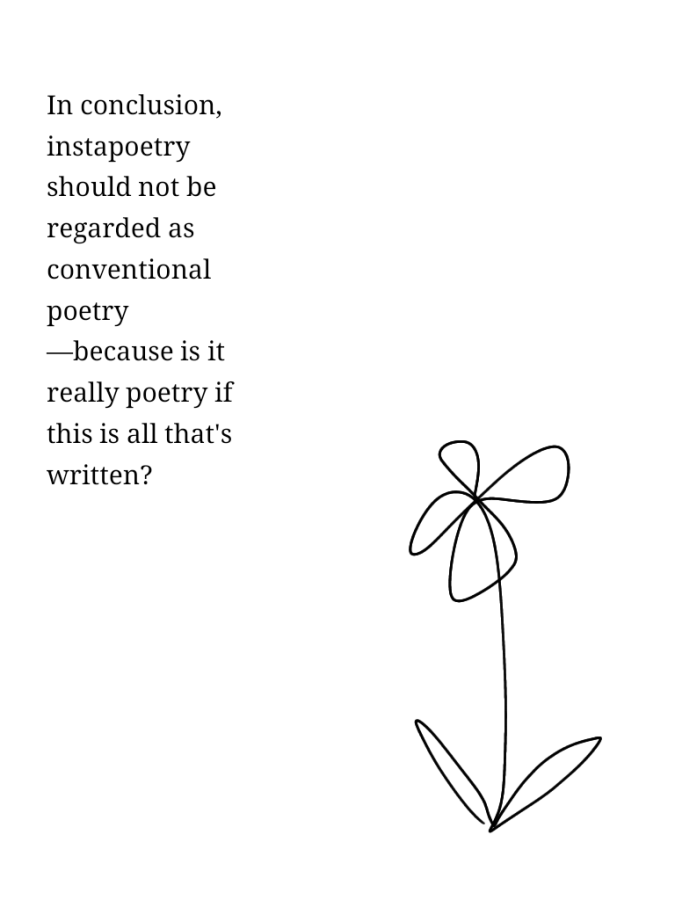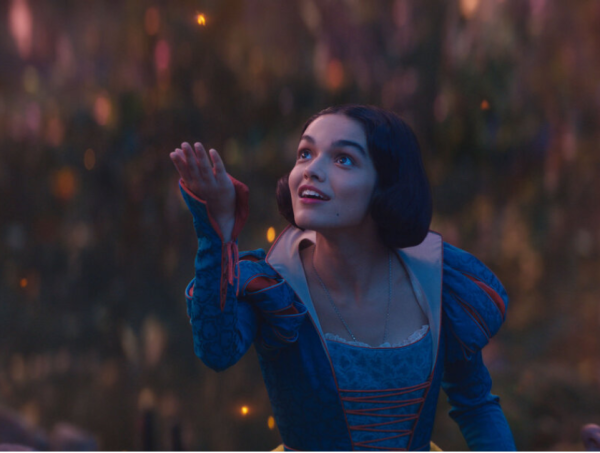Instant Ramen Poetry
In contemporary times, a new form of poetry has begun to seep into our everyday consciousness. These types of poems, labeled “Instapoetry,” are posted on social media sites such as Twitter, Tumblr, or, as stated in the name, Instagram. However, their defining trait is their format and common themes. The composition of instapoetry lacks the eloquence found in conventional poetry. It also is deficient of emotional and analytical depth and does not adhere to the standards of regular poetry. Therefore, instapoetry sucks.
Instapoetry is shallow; it uses direct, snappy lines and stanzas that are only there to attract and not to elicit questions or make the reader ponder. This type of poetry requires little thought in both reading and writing and therefore is easy to consume. Its structure usually takes up no longer than half a page, but the content it provides is often about heavy and complex topics, ranging from harrowing personal experiences to a spectrum of social issues. As such, emotions play a large part in instapoetry because it provides people with a creative outlet to express themselves and their thoughts, but the way in which people write these proclaimed poems is handled in such a straightforward way that the message and emotional depth of the pieces fall flat.
For example, Rupi Kaur, a widely acclaimed instapoet whose audience resides mainly on Instagram, writes in one of her posts:
if you were born with the weakness to fall you were born with the strength to rise
The message in this poem can be found easily: one must learn how to be strong and overcome difficulties in life. The meaning it attempts to get across is profound, but the writing is so straight to the point that all it takes is four short lines, laced with no literary devices or figurative language that offers a more in-depth perspective of the poem’s purpose, to understand the meaning. Its transparency as well as the simplicity of its format is what defines Kaur’s poetry as instapoetry rather than traditional poetry.
Moreover, instapoetry does not adhere to the standards of poetry, oftentimes to the point where it almost seems that the author placed little to no effort in writing it. There is a lack of rhetorical devices that could amplify the theme instapoets try to convey, leaving little space for readers to interpret the meaning. It leads readers down a straight path, and while that may be one of its appeals—that individuals may find it easy to quickly read through the poem and grasp its meaning twice as fast—it does not invoke introspective thoughts.
However, some people may claim that poetry is subjective and thus instapoetry should be classified under the umbrella term of poetry, rather than shedding the appellation entirely. Yet, while there are many ways to define poetry, there are evidently some works that should not be given the label of poetry. This is most apparent in one-line “poems,” which include less than twenty words. Despite it being structured akin to a quote, some individuals online continue to recognize and acknowledge it as poetry, which it is not. Some other forms of poetry written in a similar way to these one-liners would be those that use lines with a limited number of words along with simple diction.
In an excerpt from The Princess Saves Herself In This One by Amanda Lovelace:
i’m pretty sure you have s t a r d u s t running through those v e i n s — women are some kind of magic
Lovelace’s writings should not be titled as poems; it is not poetry if all a writer has to do is press enter after every line, which is meaningless and lackluster in both content and writing style. It is merely one short sentence in the guise of a stanza, and it holds no emotion upon reading. The only thing running through the v e i n s of this poem is a banal platitude. Authentic poetry should require more thought than randomly placing spaces between letters for seeming emphasis or placing one word per line to give the piece a poetic feel. These types of poetry are akin to the ones on Tumblr in 2014 when most of these self-proclaimed 13-year-old angsty teen poets tagged their posts with #poetry or #I’m 14 and this is deep. Simply put, poetry like this should not be called poetry at all due to the fact that it most likely required little thought and is deficient in the fluidity of actual ones.
In conclusion, instapoetry should not be regarded as conventional poetry. — because is it really poetry if this is all that’s written?







